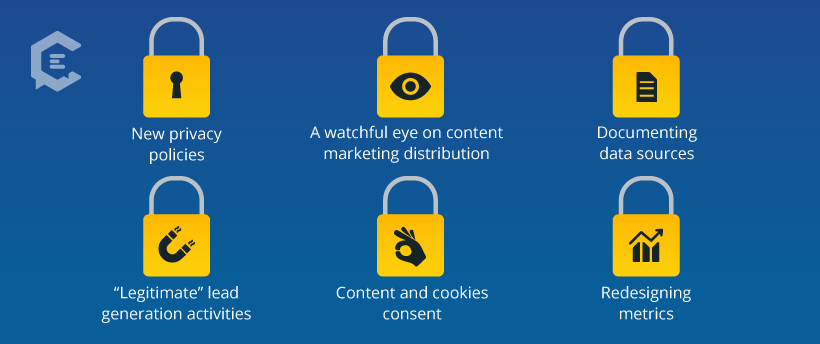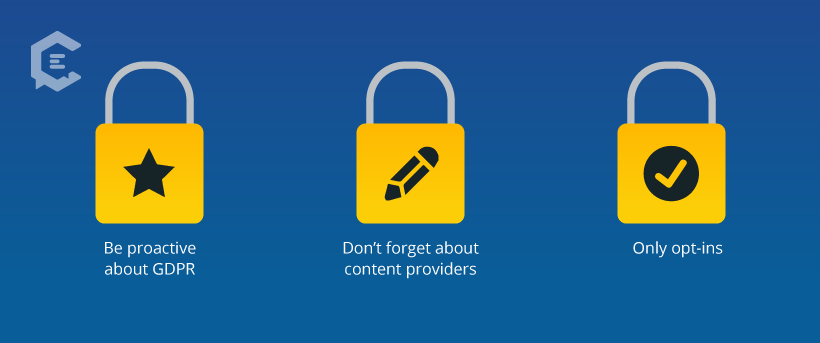After years in the making, it’s here…
No, I’m not talking about the next Marvel Comics movie…
I’m talking about the GDPR (General Data Protection Regulation) deadline: 5/25/2018.
May 25th has come and gone, but you’re likely still receiving a slew of emails each day from vendors telling you they’ve updated their privacy policies. What’s GDPR and how is it going to affect content marketing efforts?
What is GDPR?
GDPR seeks to protect the personal data of European consumers. And May 25th was the day that GDPR became front and center for all walks of marketing life. The impact of GDPR is expected to impact organizations across the globe, regardless of whether data is captured and analyzed inside or outside Europe.
According to a survey from NTT Security, 40 percent of organizations are concerned that they will be affected by the change.
How does GDPR affect content marketers?
Content marketers aren’t off the hook. They will be responsible for understanding the new regulations as many will have a direct impact on how content is distributed to consumers.
So, how exactly do the new GDPR regulations impact your content marketing efforts? Read on to learn more about the new GDPR regulations, and how to deal with them.
- New privacy policies. First and foremost, the whole point behind the new GDPR regulations is to put consumers back in control of how their personal data is stored and utilized. This changes how many marketers capture and collect both business and consumer data as a result of and for marketing activities.
- A watchful eye on content marketing distribution. Marketers who are involved with any aspect of content distribution will now be under a watchful eye. As briefly mentioned above, not only does this apply to European entities, but also any businesses that are involved with marketing activities or initiatives based in Europe. If you’re distributing content in any means that may draw in European consumers, you need to make sure you’re being ultra-responsible with the data you’re collecting from these consumers.
- Documenting data sources. Businesses will now be required to document their data sources. Businesses must prove that they have the legal consent from consumers to create and/or distribute content. Consumers must express “legitimate interests” or provide documented consent to use their data for content generation purposes.
- “Legitimate” lead generation activities. Speaking of legitimacy, this mostly applies to lead gen. For example, many businesses using the “inbound” marketing approach rely on capturing leads and personal data through “gated” content. One of the largest changes inbound marketers will need to adopt is an “active” opt-in process. When consumers request content through your website the “I agree to these terms…” checkbox needs to be empty and manually checked by the consumer in order to opt them into your mailing lists.
- Content and cookies consent. Additionally, content marketing campaigns with the goals to collect “cookies” will continue to require consent. The new GDPR guidelines also now require organizations to re-evaluate some of their methods, including targeting and predictive modeling. As a result, content marketers will be putting more focus on reaching users at the right time, and on the right platform.
- Redesigning metrics. Of course, with different practices in the mix, content marketers will have to redesign their metrics in order to measure the success of campaigns. Additionally, marketers will likely have to inform the rest of the organization on the new ways to measure the overall performance and success of content marketing initiatives.
How GDPR benefits content marketers
Now that you are likely completely overwhelmed, know that GDPR isn’t all bad news… The new “lean and clean” data environment mandated by GDPR just might be a blessing in disguise. It forces content marketers to shift their strategies towards nurturing and converting higher quality and targeted leads over quantity.
Here are some proactive ways content marketers can mitigate risks of noncompliance, and adjust to the changes brought on by GDPR:
- Be proactive about GDPR. The key to success for digital marketing and advertising — now and the future — is centered about diligent, quality data management. Taking an active role in your organization’s efforts to evaluate your current data management practices and find gaps or areas for improvement will help mitigate risks and improve processes overall.
- Don’t forget about content providers. Sure, you might do your part to ensure that your internal processes and marketing activities are compliant with GDPR, but don’t forget to evaluate your external or third-party content providers. This includes survey providers and media brands. The GDPR guidelines state that organizations that use external providers will be held responsible for ensuring all data collection practices are compliant.
- Only opt-ins. One of the biggest factors of GDPR is that marketing lists must now be opt-in only. This means that each and every name on your marketing list must have opted into receiving your emails, newsletters, and marketing material willfully. Furthermore, this also means that many businesses will no longer be able to purchase lists. As a result, businesses will be forced to build their own clean databases. How do you go about this? Maximize site traffic, ask visitors to opt-in, or use truly creative and compelling content to get them to opt-in on their own.
The solution still is producing high-quality, compelling content
All in all, the new GDPR guidelines do not suggest that businesses must give up on data collection and management altogether. The argument for high-quality, compelling, relevant and creative content is now more crucial than it ever has been. In fact, brands will likely become even more interested in “cleaner” content.
One of the keys to avoiding problems with GDPR is in publishing and sharing high-quality and valuable content. Making quality over quantity a focus of your content marketing efforts provides marketers with an opportunity to establish meaningful, willing relationships between the brand and its audience.
For example, B2Bs can rely on compelling content to position themselves as thought leaders in a particular space or sector, generating organic or “inbound” traffic from those who simply want to learn more about a topic. In this particular example, content is the most valuable asset. The better the content, the more it will work.
It is difficult to fully grasp the impact GDPR will have on marketing and on businesses as a whole. Although the potential for a significant impact is high, it should be one that is welcomed by many content marketers who focus solely on an inbound approach.
Businesses that focus more on quality over quantity, boost the quality of their content, and fully embrace the changes will not only become experts in their particular fields but will also be successful under the new GDPR guidelines.





